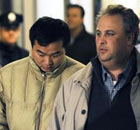Top Biz News
Blockbuster year expected for expanding silver screen industry
By Qin Zhongwei and Wang Wen (China Daily)
Updated: 2010-01-14 07:55
 |
Large Medium Small |
The capital's love affair with the movies has led to a rash of development of not only gigantic multiplexes built by cinema chains but smaller projects from private production companies.
"Although the market for cinemas is mostly saturated in Chaoyang district, especially in the CBD (Central Business District) area, Beijing still needs more cinemas in less-developed districts, such as Shijingshan, Fengtai and Daxing," said Kang Mingjun, general manager of Xindongan Cinema in Xindongan Shopping Mall, Wangfujing.
Huayi Brothers, the mainland's most high-profile movie production company, is putting together an ambitious plan to open six cinemas in major cities, including Beijing, next year. Within five years, the company hopes to have 15 locations nationwide.
"It will guarantee that our product chain is complete," Wang Zhongjun, CEO of Huayi Brothers, was quoted as saying in China Business News in October.
| ||||
"If the film industry can be thought of as a train, then cinemas are the locomotive driving it along," said Yin Hong, vice-president of the Beijing Film Association and a professor at Tsinghua University.
"Movie profits depend largely on the cinema because they are the end of the consumption cycle," he said. "As long as the number of films continues to grow, the need for cinemas will also increase."
Yin even suggested that ticket prices could fall in the future.
"The cost of cinema tickets in Beijing is too high," Yin said. "If it drops to below 30 yuan, this will attract more moviegoers with a wider age-range."
With movie-lovers prepared to wait in long lines to see blockbusters such as Avatar, observers were not surprised to learn that 2009 was the best year in Beijing's box office history.
Film fans in the capital spent 810 million yuan on movie tickets last year, a staggering 52.8 percent more than last year, according to numbers released by the Beijing municipal bureau of radio, film and television on Tuesday.
"Box office sales for December rose by nearly 20 percent compared to one year ago and attendance over the recent weekend averaged out at 80 percent," said Kang.
"The movie theater industry has seen rapid development since 2006. Each year, the number of screens increases by several dozen in Beijing."
Box office sales from the city's top three cinemas - New Capital Cinema, Stella Cineplex and UME Cinema - all topped 1 million yuan between Dec 24 and 27, according to Beijing Times.
UME, the capital's first five-star cinema, opened its third outlet at the end of November.
"Almost all the cinemas in Beijing are witnessing a boost in profits," said Yin.
According to the bureau, Beijing had 70 cinemas in 2008 with a total of 305 screens. One year later, it had 84 cinemas with 373 screens.
Included among the 373 screens are 87 3D screens and three IMAX screens. On average, there is one screen for every 40,000 citizens, which is similar to the ratio in Japan.













